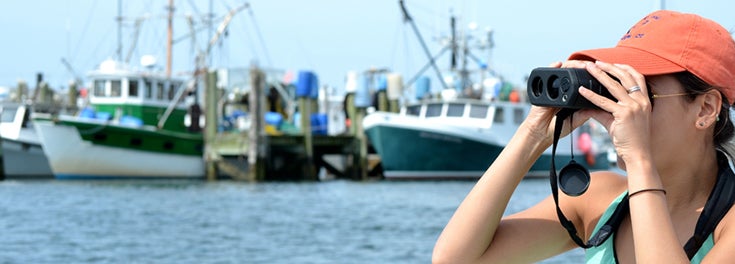 Natasha Willcox and Kayla Nitzberg have an enviable commute. They take the ferry to Block Island every couple of days where they talk to people at the local library, grocery store, and visitor’s center about their attitudes toward the wind turbines being constructed within sight of the island.
Natasha Willcox and Kayla Nitzberg have an enviable commute. They take the ferry to Block Island every couple of days where they talk to people at the local library, grocery store, and visitor’s center about their attitudes toward the wind turbines being constructed within sight of the island.
As part of a summer research project, these students are helping assess factors that influence residents and tourists to support—or oppose—the nation’s first offshore wind farm.
“It’s been a great opportunity to get involved in the social aspect of science,” said Natasha. “Everyone’s answers are unique, making their opinions and attitudes special and important.”
The project, under the direction of Assistant Professor David Bidwell, is conducted through the Department of Marine Affairs, a highly specialized environmental studies program that focuses on laws, regulations, and issues related to the ocean and coastal environment. The URI program was the first of its kind in the world, and its graduates include top officials in the Navy and Coast Guard, advisors to Congress, and leaders of state agencies and environmental organizations.
What is becoming more and more important is knowing how to conserve and manage the oceans. Marine Affairs provides the policy needed to make management decisions.
“Coastal areas are the most important areas, ecologically and economically, in the world,” said Professor Rob Thompson. “So if you’re interested in really important issues, it’s the place to be.”
This summer, you’ll find other URI students at Rhode Island boat ramps, beaches, and marinas, asking locals how they feel about their interactions with those who use the state’s salt ponds. The students are also traversing the ponds in a boat with sophisticated technology to map what activities people are engaged in. Their aim is to better understand the conflicts and compatibilities among different uses of the ponds.
“The way people are using the ponds is changing, especially with the increasing number of aquaculture facilities being proposed,” said Professor Tracey Dalton, who is leading the project with Professor Thompson. “So we want to know what people are doing there now and see how it may change as environmental conditions and policies change.”
For students who study Marine Affairs, there are a variety of interesting projects to engage in—most of which have something to do with climate change. This summer some students are creating 3D visualizations of potential hurricane damage on coastal communities, while others are conducting a vulnerability assessment of the port of Providence. Other projects deal with fisheries management issues, marine protected areas, and renewable energy.
“I believe that knowing the biology of our oceans is very important, but what is becoming more and more important is knowing how to conserve and manage the oceans,” Natasha said. “Marine Affairs provides the policy needed to make management decisions.”
